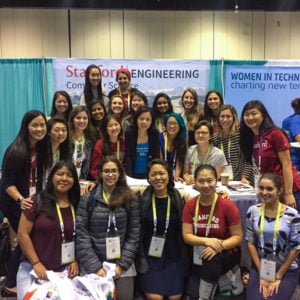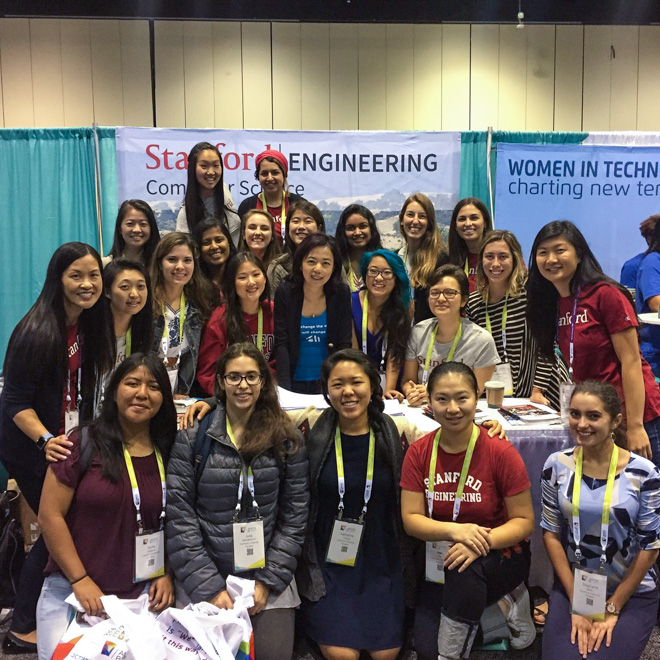For the 37 Stanford students who attended the annual Grace Hopper Conference (GHC) in Orlando, the conference kindled reflection on diversity in technology at Stanford and in the Bay Area.

Cynthia Lee, a lecturer in the computer science department, said that the atmosphere at GHC was palpably different from many tech workplaces.
“[Being a woman] is taken off the table as something that is the first thing that people react to about you or the first thing that defines you,” said Lee.
Currently the largest national gathering for women in computing, GHC is an annual series of conferences aimed at commemorating the role of women in technology. In this year’s iteration, 18,000 female undergraduate and graduate students, industry leaders and job recruiters gathered to discuss intersectional diversity issues in technology. Instead of focusing on recent controversial events such as the anti-diversity Google memo and the sexual harassment investigation at Uber, the conference focused on motivating women to persist in the field of technology, highlighting the different ways to improve gender parity.
As they returned from the conference, students reflected on the hurdles women face both inside and outside of their classes at Stanford. Nishtha Bhatia ’19 said that the social environment can be discouraging in higher level computer classes, where she found diminishing numbers of women.
“You’re more likely to take a hard class if you’re taking it with people [with] whom you are friends,” said Bhatia. “And if the gender ratio in those classes typically is not great, then the likelihood of you knowing someone in those classes is also not great.”
According to Lee and Bhatia, the less welcoming aspects of tech culture at Stanford often affect individuals outside the classroom as well. Comments made in dorms or even the LaIR, office hours for the introductory CS classes, may lead to corrosive self-doubt.
One common behavior is “making a contest of how little time a student spends on the assignment,” Lee noted. As a result, some students may think that they are not cut out for certain classes or fields of study.
“The reaction that is not so instinctive is: ‘I spent eight or 10 hours on that assignment, but I learned a lot and I’m as ready as someone else. If someone spent less time than me, it’s probably because they had more experience coming into this, but that doesn’t mean coming out of this we won’t be at the same level,'” said Lee.
She added that conversations like these exacerbate impostor syndrome and can negatively affect even students who are doing well.
Students also voiced their experiences of objectification and discrimination in tech-related activities and internships. A conference attendee who wanted to be known only as C. Millar ’19 out of concern for her future employment prospects said she sometimes feels uncomfortable as a result of subtle comments or behaviors—being called “darling” or knowing that she doesn’t “look like an engineer”.
Millar added that these issues are especially tricky to resolve because these experiences are often pushed under the rug, especially when the situation involves superiors — whether an upperclassman or a boss.
Ethics beyond diversity
With the advent of social media, many technology products are created with the intent of maintaining user attention for as long as possible. The ethical problems that come with creating these products were on the minds of many who attended the conference.
“When the users intersect with the creators — let’s say software engineers — it’s up to us to be that voice of reason so that we’re creating a new generation of products that [has the] user’s benefit in mind along with the companies’,” Bhatia said. “Finding this intersection is one of the greatest challenges and also one of the coolest things there is to work on.”
Fei-Fei Li, associate professor of computer science and director of the Stanford Artificial Intelligence Lab and the Stanford Vision Lab, emphasized the importance of ethics in artificial intelligence in her talk at the conference.
“[The] whole talk centered on how artificial intelligence (AI) really has to be a very human field,” said Anjini Karthik ’20, who attended Li’s talk. “Everything we design in terms of AI should be with human consideration.”
During the talk, Li also said that technology creators have a responsibility to teach computers human values, since machines that use databases of biased information tend to show prejudice toward marginalized groups.
After GHC
Returning from the conference, Angelica Wills ’19 said she felt empowered after meeting women leaders in technology leaders such as Megan Smith, former CTO of the United States, and getting meaningful mentorship at a non-profit organization booth.
Willis said her key takeaway was the three different aspects of mentorship: “to find someone who has reached a really high place in their career, someone who is just a little bit ahead of you, and someone who is a peer mentor at the same level as you.”
Beyond GHC, initiatives on campus such as the student group Women in Computer Science and off-campus organizations such as Girl Who Code are also working to empower the younger generation of female engineers to make their own way in tech.
“For girls, there are so many opportunities for people to put you down that it just seeps into other areas of your life,” Miller said. “And so it’s not just teaching girls how to code; it’s teaching girls how to believe in themselves and stop apologizing.”
Contact Evani Radiya-Dixit at evanir ‘at’ stanford.edu.
